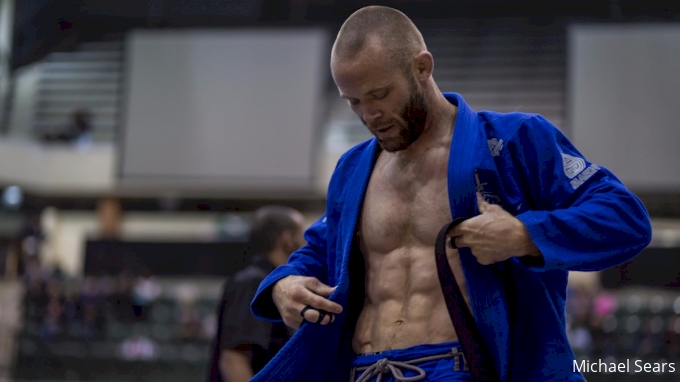The Tao of Josh Hinger: Lessons on Mental Toughness, Highs And Lows, & More
The Tao of Josh Hinger: Lessons on Mental Toughness, Highs And Lows, & More
Simply stated, Josh Hinger is exceptionally thoughtful in his training methodologies and professional in his execution.

Don't let his gruff apperence and merciless approach to the gentle art fool you: Josh Hinger is exceptionally thougtful in his training methodologies and professional in his exectuion.
A late bloomer, Hinger is chasing his third IBJJF no-gi world title and a Fight 2 Win belt at the age of 36, and over the course of his nearly five-year black belt career, the black belt has certainly refined the way he trains.
In the course of his interview, Hinger reveals some of the theories behind his strength and conditioning programing, what training like a professional REALLY means, and a primer on the pursuit of elite mental condiniting.
Strap in — it's time to enter the tao of Josh Hinger.

Chase: What's up Josh? Thank you for the time. What’s the latest with Atos’ eldest savage?
Josh: I guess I am the eldest (laughs). Nothing much, nothing out of the ordinary I should say. We are really focused on No-Gi Worlds. Part of the reason I took this upcoming match with Lovato Jr. at F2W 95 was to get in excellent shape two weeks early for No-Gi Worlds.
I’ve been training at a new gym, Gym Jones, a strength and conditioning facility with a lot of circuit training and powerlifting based out of Salt Lake City. I like to go out there and train – I’ve learned a lot of stuff, a lot of new exercises, and ways to think about working out. I come back to San Diego and re-create the circuits here.
Watch Fight 2 Win 95 LIVE Dec. 1 5:30pm PST on FloGrappling
Chase: Can you discuss your current training regiment and schedule? You seem to be lifting at least five days a week? How has that affected your jiu-jitsu?
My goal for lifting is three times a week. Ideally, Monday, Wednesday, Friday, or Tuesday, Thursday, Saturday. I don’t want to say it's affected my jiu-jitsu. It’s just affected by the ability to squeeze people. It depends on what I’m working on.
Of course, it’s helped – you can’t do jiu-jitsu if you’re tired. So it’s very useful to have great conditioning and great cardio to squeeze and hold someone without burning out. Rafa Mendes told me once that I felt really strong and I was like, "Man, that’s the worst compliment you can give a jiu-jitsu guy," and Rafa replied, "No, technique without strength is useless."
Also, spending all day every day on the mats can simply wear you out and a change of scenery is nice. Circuits are great for getting your cardio to the next level without having to beat someone else up in the process. Not every training partner can push you, some people play very defensively... so it's nice to have a hard circuit set up and you can really just kill it by yourself with a couple kettlebells and a rowing machine and battle ropes.
One thing is important to do as an athlete who is trying to get into great jiu-jitsu shape is to hit the gym really hard; crush some legs, or deadlifts workouts in the morning and then go train at jiu-jitsu in the evening. That’s pretty tough and something that I do believe pushes your jiu-jitsu to another level.
Being exhausted and still trying to hold off your teammates. Often times you get beat up; it’s no fun, but if you can hold them off after a hard leg or chest day you expect better results when you’re fresh. That’s one thing that’s helped me a lot. I don't enjoy doing that and I try to avoid doing a leg routine before I train jiu-jitsu, but there is definitely a benefit.
Chase: Your instagram delivers a wealth of interesting posts containing messages on training methodologies, strength and conditioning routines, and so on, but I quite enjoy your posts pertaining to mental fortitude. What are the major mistakes and pitfalls people fall into when they are trying to develop mental toughness?
I don’t think I’m the expert on how to be mentally tough. If I had to recommend [a good place to start] I’d point them towards the Joe Rogan Podcast featuring David Goggins. It's amazing, and a lot of the things I think about when I’m trying to toughen up go back to that podcast.
One of the things Goggins always talks about is "callusing your mind" – if you see something difficult you have to do it. Even if you don’t want to, especially if you don’t want to.
If you’re trying to develop mental toughness it’s important to get out of your routine and try something new... In jiu-jitsu, maybe you’re a wizard in the gi, but you don’t like to do no-gi, no-gi takes you out of your comfort zone. For me, that means playing guard – I hate playing guard (laughs), but sometimes I have to do it. That’s where [Andre] Galvao comes in as a great coach – he knows our weaknesses and forces us to work on them, at least some of the time. He’ll make me play guard and send some monster to come after me.
One mistake people can make is they follow a routine. And it might even be a difficult routine. But it’s not good to get stuck in a routine because it becomes a comfort zone. I catch myself doing the same thing with my leg routines – I have four, five exercises that I do, and sometimes I have to force myself to do something else to become uncomfortable.
Another mistake people can make in pursuit of mental toughness is neglecting proper rest and care.
"Once your body is broken down to you have to take care of it. You need a massage, acupuncture, physical therapy, cryotherapy, etc. A lot of people are willing to do gritty hard work and push themselves really hard, but they are not willing to spend the money and time on recovery and rebuilding themselves after they tear themselves down. That’s how you get stronger."
Chase: F2W 95 is just a few days shy of your fifth anniversary of receiving your black belt. As you wrote last year commemorating the experience, I’m sure the lessons are innumerable, but I was hoping you could tell us about some of the highest and lowest points of the journey?
It’s been an interesting five years. The highs and lows aren’t something I can think about in terms in years though – highs and lows come each and every week. Sometimes you have a good training day sometimes it’s a rough one. Good tournaments and bad. It’s been a wild ride.
My perspective has changed a lot in terms of how I view a class or training situation. A lot of people are there for recreation – especially in the evenings – and that's just not the way I look at it anymore, like at all. Jiu-Jitsu is not recreational; it’s a job. And I like it. I’m not saying I don’t like it, but when I’m training it’s very difficult for me to play around, or keep it playful as some people say (pause..) Well, I can, but I feel like I’m wasting my time or someone else time. So even though I can keep it playful, I don’t.
I’m not saying anyone else should be like that, but it’s just how my perspective has changed. I’ve had more competitive success by having more focus and training with a purpose.
Chase: Is training professionally simply a question of intensity?
Yes, it’s definitely a question of intensity. Basically, the way I see it is that you’re training to win. Some people want to just move around, or have a high-paced flow with someone. But the goal for me when I’m training is to fight to win.
That means keeping track of the score in your head, strategizing against your opponent– for example I know Keenan or Nisar [Loynab] are going to want to play guard, I need to create a plan for that. I’m treating it like a tournament match.
Chase: What’s next for the rest of 2018 and early next year? Will we see you defend your No-Gi Worlds title and at ADCC west coast trials?
I will be at No-Gi Worlds assuming I’m injury-free after this match with Lovato. I’m definitely planning on competing at ADCC West Coast Trials, and I am potentially competing at European Championships in January as well.